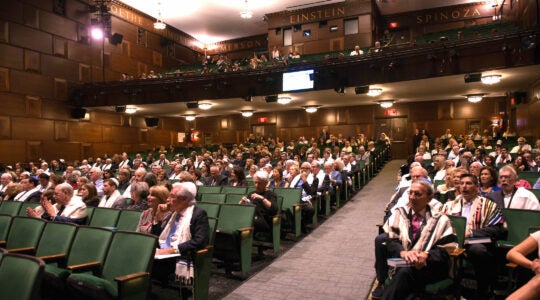HERZLIYA, Israel (JTA) — In the sleek, blue auditorium filled with spotlights and large video screens at Israel’s premier annual national security policy conference, all eyes were fixed on the revolution next door, in Cairo’s Tahrir Square.
From the Israelis among the experts, diplomats and security officials assembled for the 11th annual Herzliya Conference near Tel Aviv, there were dark assessments and discussion of preparing for worst-case scenarios.
"Like all Israelis, we’d like to see democracy in Egypt," Shlomo Avineri, a leading political scientist at Hebrew University and a former director of Israel’s Foreign Ministry, said in a speech Wednesday. "However, that’s probably not going to happen."
Comparing events in Egypt to the days when the Soviet Union collapsed and the world was awash with hopes for political freedom, Avineri noted that "we got Putin instead, a neo-absolutist system."
"Something similar might transpire in Egypt because you need a civil society, a belief in tolerance and individualism. Those elements were lacking in Russia and they are lacking in Egypt," he said. "We should be realistic even with all our support for the people of Egypt and democracy."
The Herzliya Conference has become the annual setting for assessing the current focus and outlook of Israel’s political and security elite. As Israel watches and waits to see how things in Cairo will shake out, the conference served as an opportunity to speculate about the future and mourn the possible passing of an era of stability along Israel’s southern border with Egypt.
The changes in Egypt and the possible ripple effect they pose for the rest of the Arab world prompted many to argue for Israel to redouble its efforts on securing a peace deal with the Palestinians.
"Our region is moving very fast to the next war, and the only way to stabilize events in Tunisia and Egypt is to find stability by having an interim peace agreement,” said Shaul Mofaz, a former defense minister and chief of staff who is now part of the opposition. “We need to rebuild trust between both sides."
Israeli President Shimon Peres made a similar plea in his opening remarks at the conference.
"The recent dramatic events raise the need to rid the Israeli-Palestinian conflict from the agenda,” he said. “The conflict is being used by all sides for the worse. The peace process is crucial for our neighbors, not just for us.”
Yet in an indication of the deteriorating relations between Israel and the Palestinian Authority, none of the Palestinians who were invited to the conference agreed to come. PA President Mahmoud Abbas was among the speakers last year.
Israel’s prime minister usually speaks at the conference, along with other top Israeli officials and diplomats and security experts from around the world. But this year, neither the prime minister nor any senior Cabinet ministers delivered speeches — perhaps a reflection of the radio silence Prime Minister Benjamin Netanyahu at first demanded after news of the budding revolution in Egypt broke last month.
The conference at times felt like something of an unofficial shiva for President Hosni Mubarak’s Egypt — not a warm and fuzzy ally, but most important for the Israeli security community, a reliably stable one.
The lingering standoff in Egypt between anti-government protesters and Mubarak is a source of added concern for the Israelis. Security experts said that the longer the uncertainty lasted, the more likely it would be followed by radicalism.
"The longer President Mubarak stays, the more it endangers an orderly transition and the more Vice President Omar Suleiman and the army are tainted by the street, and the more this goes on the more Egypt is in free fall," said Salman Shaikh, director of the Brookings Doha Center in Qatar.
Shaikh was joined by Egyptian and Jordanian colleagues during a session on the Arab street and its effects on regional stability.
There was also much discussion of the long list of brewing regional concerns — the looming threat of a nuclear Iran, Hezbollah’s growing political influence in Lebanon, Islamicization in Turkey — not to mention the possible impact of the events on Egypt on peacemaking with the Palestinians.
“Who will come to power and push the Palestinians towards concessions with Israel?" asked Yakov Amidor, a retired Israeli general who held senior roles in military intelligence. "Things have changed for the worse, not the better.”
Amidor said that weapons smuggling into Gaza had increased since the start of the unrest in Egypt, and Hamas in the long run would be strengthened by a new regime in Cairo.
Most analysts who spoke at the conference agreed that the prospect of the Muslim Brotherhood — Egypt’s version of Hamas — seizing control in Egypt was slim. But the consensus was that whatever government comes to power next in Cairo wouild be less amenable to Israeli and American interests than the current one.
In a marked departure from the tone of anxiety and concern coming from most of Israeli officialdom, Peres portrayed a less threatening picture of the revolt in Egypt, calling it a spontaneous uprising by youth "wearing T-shirts and jeans.”
The protests, he said, were “not organized by an army, a religion or political parties," but by young Egyptians using the Internet.
“You can lock the doors, but the Internet opens the windows,” said Peres, who called the unrest a “social rebellion rather than a political one."
NATO Secretary General Anders Fogh Rasmussen sounded a more ominous note. Speaking at the conference, he said the persistence of the Israeli-Palestinian conflict contributes to the overall sense of instability in the Middle East and urged the sides to take action.
“We do not have all the time in the world," Rasmussen said. "There is a new dynamic in the region. We must seize the opportunity to build on it."
The New York Jewish Week brings you the stories behind the headlines, keeping you connected to Jewish life in New York. Help sustain the reporting you trust by donating today.




